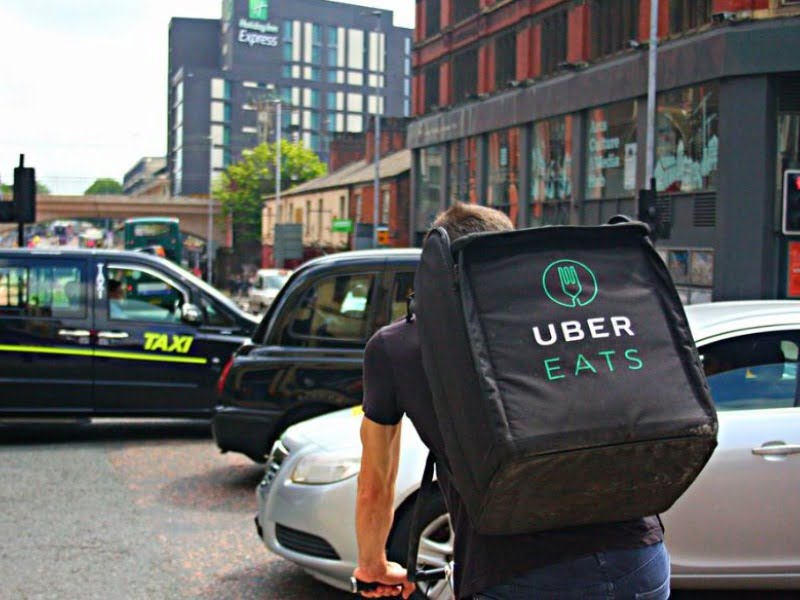The largest gig economy companies in Australia have told a senate inquiry they are open to working with the federal government on minimum standards for the sector, but won’t budge on reclassying their workers or guaranteeing them minimum wage.
Representatives from Uber, UberEats, Deliveroo and Ola appeared at a public hearing for the Senate Select Committee on Job Security on Monday morning, facing questions around the safety of workers in the gig economy, accident insurance, minimum rates of pay and the potential for more regulation.
The tech firms also railed against state governments going it alone following significant inquiries in NSW and Victoria, arguing that it is a job for the federal government to regulate the sector.
Each of the ridesharing and food delivery firms admitted that their workers were being paid less than the minimum wage for casual workers.
The tech giants appeared after the Transport Workers Union (TWU) at the inquiry, with its national secretary Michael Kaine slamming their business models and calling for significant reforms.
“The cost of the gig economy is simply devastating. Each day workers are stripped of their livelihoods at the whim of an app notification with no redress. Those who are not are subject to dangerous toil with the despair of vainly trying to subsist on less than half the national minimum wage,” Mr Kaine said.
“We can be a nation which embraces this latest wave of technological change and innovation in a way that is shaped by an unwavering commitment to fairness, equality and community. But our laws must change, and we must act now.”
While the TWU has called for the establishment of a new tribunal to determine issues such as what type of work is being completed and how much pay and benefits workers are entitled to, the gig economy firms instead said they want to work directly with the federal government to improve conditions in the sector.
This won’t come at the cost of the flexibility which these companies say their workers enjoy, with each firm railing against proposals to pay all workers the minimum wage and other benefits.

Executives from Uber and UberEats called on the government to work with them on implementing minimum insurance requirements for gig economy workers across the sector, and also proposed a pool of funds to be used for portable entitlements such as sick leave.
“We want to sit down with drivers and work out what the right benefits are. We don’t think flexibility should come as a trade-off from protection, we want to enhance the protections in the gig economy,” UberEats general manager Matthew Denman told the senators.
“We’re really excited to work with the committee and most importantly to listen to drivers and understand what the right benefits are here in Australia to improve the quality of work in the gig economy.”
He said that such a portable benefits scheme would be an “innovative” way to provide this support.
The Uber executives admitted that the $21 hourly wage for UberEats riders in Sydney during peak meal-times, reported in an Uber-commissioned report, is still below the minimum casual rate of pay, which is $24.80.
In its submission to the inquiry, Uber said a national response is needed for the gig economy, rather than state governments going it alone.
Deliveroo executives appeared following the Uber representatives, with the firm also fighting back against the concept of paying gig economy workers the minimum wage.
“I don’t believe that regulated rates is what riders want. They see regulated rates as maximum rates. Today a rider can work for multiple platforms, maximise their earnings by picking and choosing the jobs most attractive to them,” Deliveroo Australia CEO Ed McManus told the senators.
In its submission, Deliveroo said the potential of reclassifying workers from contractors to employees is a “considerable disincentive for platforms who want to protect flexibility for riders and their operating model to provide any such benefits”.
The company also backed Uber’s calls for the federal government to take a lead in these reforms, despite continually appearing unwilling to do so.
“We believe any policy proposals around work status must be driven by the federal government to ensure national consistency and clarity. A patchwork of incompatible Commonwealth, state and territory laws and regulations risks creating confusion for riders and unfairness in the system,” the Deliveroo submission said.
“The creation of state by state-based regulation would create additional burdens and costs to organisations having to implement – and then monitor – new rules.”
Appearing earlier at the inquiry, smaller ridesharing firm Ola revealed that it had stopped providing its workers with accident insurance in the middle of the COVID-19 pandemic last year. This was a “financial decision” made by the India-based company in June last year, meaning its riders who are injured on the job don’t receive any income support or coverage for medical expenses.
Ola Australia head of legal Ann Tann was unable to answer questions from senators on how many Ola drivers and riders have been injured on the job. Ms Tann said that Ola workers earn on average $21 per hour, but appeared unable to say whether this was above or below the minimum wage. This figure is below the minimum wage for casual workers.
Ola Australia also emphasised the “flexibility” it offers workers.
“We generally would welcome policy positions with better outcomes for drivers and at the same time maintain the level playing field for the industry,” Ms Tann said.
Do you know more? Contact James Riley via Email.

